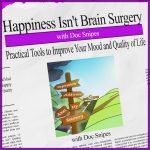
Happiness Isn’t Brain Surgery
Assessment: Identifying the Problem
Premise
~ Your mind and body are interconnected
~ Unhappiness is caused by an imbalance in neurotransmitters
~ What causes that imbalance varies greatly between people
~ Often there is a physical health component that needs to be addressed for recovery to be successful
~ This is why antidepressants fail in such a large percentage of the population.
Objectives
~ Define the purpose of assessment
~ Explore the steps in the assessment
~ Learn about the first steps in moving toward happiness
Purpose of Assessment
~ To identify symptoms
~ Explore the course of the symptoms
~ Identify exacerbating and mitigating factors
~ Determine the impact of symptoms
~ Identify change goals
~ Develop an action plan based on identified goals
First Steps
~ Identify the Problem
~ Identify the Solution
~ Learn about what causes the problem in general
~ Learn about what causes the problem for you
~ Learn about possible solutions
~ Identify solutions that will work for you
~ Develop a plan to start implementing those solutions
Presenting Problem
~ Presenting problem
~ What are your symptoms (as evidenced by)
~ How long has each been going on
~ What makes it worse
~ What makes it better
~ What are the consequences of each symptom (as evidenced by)
Resolution/Goal
~ What does happiness look like for you?
~ What will be different?
~ Emotionally
~ Mentally
~ Physically
~ Socially (self-esteem, relationships and recreation)
~ Environmentally
~ What will be the same?
Transactional Model
~ The way you feel emotionally or physically impacts
~ How you interact with others
~ Your stress response
~ Your attitude and ability to concentrate
~ Your environment
~ Each one of those things also impacts how you feel
Evaluate potential causes of the symptoms
~ Physical
~ Sleep
~ Nutrition
~ Pain/Illness
~ Sunlight
~ Exercise
Evaluate potential causes of the symptoms
~ Age
~ Many physiological changes take place as a result of age. Taking this into account can assist in determining some of the possible causes of symptoms
~ Younger people have fewer experiences against which to judge current experiences
~ The culture and environment changes for people of different ages.
Evaluate potential causes of the symptoms
~ Social
~ Your immediate family
~ Social supports
~ Stressors
~ Self-Esteem
~ Environmental
~ Active/Interruptions vs. Calm/Peaceful
~ Supportive of sleep?
~ Supportive of relaxation?
Evaluate potential causes of the symptoms
~ Emotions
~ Anger
~ Anxiety
~ Depression
~ Happiness
~ Thought triggers for each emotion
Symptom Assessment
Symptom Assessment: Lenny
Next Step
~ Work on becoming mindful of your symptom triggers
~ Do a mindfulness scan prior to each meal to identify how you feel and what you need…
~ Emotionally
~ Mentally
~ Physically
Summary
~ The Assessment is really the beginning point
~ It helps you get a clearer idea of what may be causing your symptoms or making them worse.
~ Proper nutrition, adequate quality sleep and pain management are all necessary for happiness
~ At this stage you are starting to envision what happiness looks like for you.
~ Identify what things are good uses of your energy
~ Identify those things that are draining your energy and start exploring how to deal with them.
Summary
~ Related Videos
~ Understanding Symptoms
~ The Mind-Body Connection
~ Mindfulness
~ Motivation
~ Goal Setting
~ Sleep and Happiness
~ Nutrition and Happiness
~ Emotion Regulation
~ Distress Tolerance
~ ACT Matrix
~ Interpersonal Effectiveness Skills
Connect With Us
